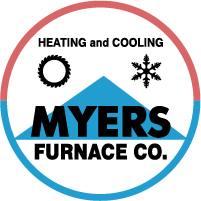
We can all benefit from saving a few bucks from time to time. One of the easiest ways to accomplish this is by improving energy efficiency in your home. Upgrading your HVAC equipment or adding a smart thermostat, for example, offers more control over your HVAC system, contributing to a more energy-efficient home and more affordable monthly energy bills.
Read on to read about 4 ways you can make energy-efficient home improvements.
1. Install Smart Home Products Like a Smart Thermostat
If you still use a round-dial thermostat and control it manually, consider taking a step toward the future by installing a smart, or Wi-Fi, thermostat – which contains several features to make your home more energy efficient.
The feature homeowners like the most is having the capability to control their smart thermostats from wherever with their smartphone or other smart device. As an example, when you forget to use your thermostat before leaving for vacation, you can just pull out your smartphone and make any needed adjustments.
Similar to a programmable thermostat, a smart thermostat permits you to pre-set your home’s temperature determined by the time of day and day of the week so you’re not cooling or heating an empty house. Smart thermostats also feature the capacity to learn your temperature preferences over time and automatically make energy-efficient adjustments. They also create monthly energy reports that illustrate how much energy you are using and when so you can make modifications to save money.
If you’re curious about how to get a free smart thermostat, talk to your utility company to see if there are any discounts or free smart thermostats offered.
2. Routine HVAC Maintenance
Sadly, lots of homeowners often forget to have their heating and cooling systems maintained. While this might not seem like a huge deal, inadequate maintenance could produce a number of issues, including inefficiency, breakdowns, and a shorter system lifespan.
When performing an HVAC maintenance service, your technician is going to examine your HVAC system, clean necessary components, and catch minor problems before they lead to bigger, more expensive repair issues. Maintenance can keep HVAC systems working at optimal condition, which means less energy is used to heat and cool your home. This can help with your energy bills, increase the lifespan of HVAC equipment, and contribute to fewer repairs.
We recommend two HVAC tune ups each year – once in the spring before summer and one in the fall before the arrival of frigid weather.
3. Upgrading Your Old, Inefficient HVAC Equipment
Annoyingly, like any appliance, HVAC systems can't run forever and eventually need to be replaced. New heaters and cooling equipment is much more energy efficient than models produced just over 10 years ago. Fortunately, quality HVAC companies like Myers Furnace Company can handle professional services such as furnace installation in Belton.
Well-maintained furnaces and air conditioners can last approximately 15-20 years. If the equipment is within that timeframe, it can be a good idea to replace them ahead of time to prevent premature breakdowns that can leave you cold and uncomfortable on a cold winter night. If your HVAC system is approaching 15 years old and requires an expensive repair, it’s definitely time to replace it. According to the U.S. Department of Energy, getting a new HVAC system could save you between 20-40% on your monthly energy bills, so you’ll recoup some of the costs of installing a new system.
A professional comfort technician can help you find the most energy efficient HVAC system on the market. As a general rule of thumb, seek out HVAC systems that are Energy Star certified, meaning the equipment meets strict guidelines set forth by the U.S. Environmental Protection Agency. LENNOX HVAC systems are some of the most efficient systems available, offering both high AFUE and SEER ratings. AFUE is used for heating systems and illustrates how well they convert fuel to heat. SEER, meanwhile, is used to calculate the efficiency of air conditioning systems.
Call a reputable HVAC provider like Myers Furnace Company for air conditioning installation in Belton.
4. Use Energy-Efficient Air Filters
When you’re shopping for new HVAC filters, consider that not all air filters are created equally. Specific air filters are far more successful than others, resulting in lower energy bills and cleaner indoor air.
The performance of HVAC air filters is scored by their Minimum Efficiency Reporting Value, or MERV rating. The MERV scale ranges from 1-20; the higher the number, the more effective the filters are. It’s important to note, however, that high-efficiency air filters can actually obstruct airflow too much according to the type of HVAC system you installed. It’s worthwhile to study the owner’s manual before buying a filter to find the right one for your system.
